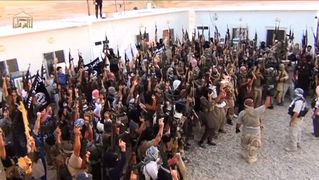
Guests
- Noam Chomskyworld-renowned political dissident, linguist and author. He is institute professor emeritus at Massachusetts Institute of Technology, where he has taught for more than 50 years. His forthcoming book, co-authored with Ilan Pappé, is titled On Palestine.
As Iraq launches a new military operation to retake the city of Tikrit from the self-proclaimed Islamic State, thousands of Iraqi forces and militia fighters have converged in the city Samarra to strike nearby ISIS strongholds. The United States is expected to provide air support as part of its continued bombing campaign. The offensive comes as the Iraqi military prepares for a major U.S.-backed operation to retake Mosul from ISIS in the coming weeks. ISIS “is one of the results of the United States hitting a very vulnerable society with a sledgehammer, which elicited sectarian conflicts that had not existed,” says Noam Chomsky. “It is hard to see how Iraq can even be held together at this point. It has been devastated by U.S. sanctions, the war, the atrocities that followed from it. The current policy, whatever it is, is not very likely to even patch up or even put band-aids on a cancer.”
Transcript
AMY GOODMAN: This is Democracy Now!, democracynow.org, The War and Peace Report. I’m Amy Goodman, with Aaron Maté. Noam Chomsky is our guest for the hour, the world-renowned political dissident, linguist, author of over a hundred books, MIT professor emeritus. Aaron?
AARON MATÉ: Yes. Noam, I wanted to ask you about ISIS. The big news is that Iraq is planning a major offensive to retake Mosul. It’s currently launching strikes to recapture Tikrit with U.S. support. My question is about the effectiveness of the U.S. strategy. To what extent is the U.S. constrained by its own policies in terms of the effectiveness of defeating ISIS, constrains in terms of its ties to Saudi Arabia and its refusal to engage with Iran and groups like Hezbollah, which have been effective in fighting ISIS?
NOAM CHOMSKY: Patrick Cockburn, who has done by far the best reporting on this, describes it as an Alice in Wonderland strategy. The U.S. wants to destroy ISIS, but it’s opposing every force that’s fighting ISIS. So, the main state that’s opposed to ISIS is Iran. They support the Iraqi government, the Shiite government. But Iran is, you know, on our enemies list. Probably the main ground forces fighting ISIS are the PKK and its allies, which are on the U.S. terrorist list. That’s both in Iraq and in Syria. Saudi Arabia, our major ally, along with Israel, is both traditionally, for a long time, the main funder of ISIS and similar groups—not necessarily the government; rich Saudis, other people in the emirates—not only the funder, but they’re the ideological source. Saudi Arabia is committed, is dominated by an extremist fundamentalist version of Islam: Wahhabi doctrine. And ISIS is an extremist offshoot of the Wahhabi doctrine. Saudi Arabia is a missionary state. It establishes schools, mosques, spreading its radical Islamic version. So, they’re our ally. Our enemies are those who are fighting ISIS. And it’s more complex.
ISIS is a monstrosity. There’s not much doubt about that. It didn’t come from nowhere. It’s one of the results of the U.S. hitting a very vulnerable society—Iraq—with a sledgehammer, which elicited sectarian conflicts that had not existed. They became very violent. The U.S. violence made it worse. We’re all familiar with the crimes. Out of this came lots of violent, murderous forces. ISIS is one. But the Shiite militias are not that different. They’re carrying out—they’re the kind of the—when they say the Iraqi army is attacking, it’s probably mostly the Shiite militias with the Iraqi army in the background. I mean, the way the Iraqi army collapsed is an astonishing military fact. This is an army of, I think, 350,000 people, heavily armed by the United States and trained by the United States for 10 years. A couple of thousand guerrillas showed up, and they all ran away. The generals ran away first. And the soldiers didn’t know to do. They ran away after them.
AMY GOODMAN: We have 20 seconds.
NOAM CHOMSKY: Hmm?
AMY GOODMAN: We have 20 seconds.
NOAM CHOMSKY: Yeah. Well, now, it’s basically—the effect, it’s hard to see how Iraq can even be held together at this point. It’s been devastated by U.S. sanctions, the war, the atrocities that followed from it. The current policy, whatever it is, is not very likely to even patch up, put band-aids on the cancer.
AMY GOODMAN: We’re going to have to leave it there, but we’ll continue this discussion tomorrow on Democracy Now! Our guest, Noam Chomsky, institute professor emeritus of the Massachusetts Institute of Technology.













Media Options